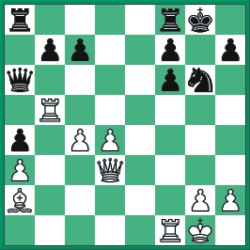|
Time
Out
The Gambiteers Chess
There
were, and still are, those habitual gambiteers. These players
love to pounce on the enemy very early in the game. They sacrifice
one or two pawns to get a big lead in development, and then
try to take advantage of the time wasted by the opponent.
It is essentially a fight between time and material.
In the
early days of modern chess, gambits often led to quick victory
for the first player. The pawn grabbers used to take everything
coming their way and invariably crossed the limits of safety.
They believed that the best way to refute a gambit was to
accept it--an axiom that still contains a dose of truth. But
the point is, the grabber must know when to stop swallowing
the poisoned stuff that could endanger his life. The modern
player knows when not to accept a pawn just as much as he
knows when to capture it and retain a material advantage.
The advantage can usually be retained through making a series
of solid moves to blunt the force of the enemy's initiative.
Yes, initiative
is what the gambiteer is looking for. He is ready to pay a
price for it. But how much? That is still an unanswered question.
It really depends on the defensive capability of the player
across the board. Be careful! Against a really good defender,
gambits are likely to backfire. Remember how easily Victor
Korchnoi handled the explosive Tal attacks.
That
said, some gambits are sound. For example, the Queen's Gambit
is not a gambit in the true sense as the second player feels
obliged to return the pawn. And even if he keeps it temporarily,
the first player gets adequate counter play. Gambits sharpen
your tactics. So the beginners should try them until they
learn that these hazardous things should not occupy a permanent
place in their opening repertoire.
Interestingly,
a tournament was organised in Baden, 1914, where the players
had to try some gambit line in the opening. Rudolf Spielmann,
who had a great penchant for attacking chess , must have enjoyed
every bit of it!
Here
is a game played by him.
White-Rudolf Spielmann
Black-Hans Fahrni[C36]
Baden 1914
1.e4
e5 2.f4 exf4 3.Nf3 d5 4.exd5 Nf6 5.Nc3 Bd6 6.Bc4 00 7.00 Bg4
8.d4 Nbd7 9.Bb3 Nb6 10.Qd3 a5 11.a3 a4 12.Ba2 Bxf3 13.Qxf3
Qd7 14.Ne2 Qb5 15.Nxf4 Bxf4 16.Bxf4 Qxb2 17.Qd3 Nbxd5 18.Bd2
Qb6 19.c4 Ne7 20.Rab1 Qa6 21.Bg5 Ng6 22.Bxf6 gxf6 23.Rb5 Rad8
24.Rh5 Qd6 25.d5 Kg7 26.Qe3 Rh8 27.c5 Qe7 28.Qh6+ Kg8 29.Qc1
b6 30.d6 cxd6 31.cxb6 Qe2 32.Qc7 Qe3+ 33.Kh1 Qe7 34.Qc3 Kg7
35.Rhf5 Rhf8 36.Rxf6 Qe5 37.Rxf7+ Rxf7 38.Rxf7+ Kh8 39.Qxe5+
Nxe5 40.Rc7 Rb8 41.b7 Nc6 42.Bd5 Na7 43.Be6 1-0

Position
after 23.Rb5
-PATZER
Copyright
(R) thedailystar.net 2004
| 